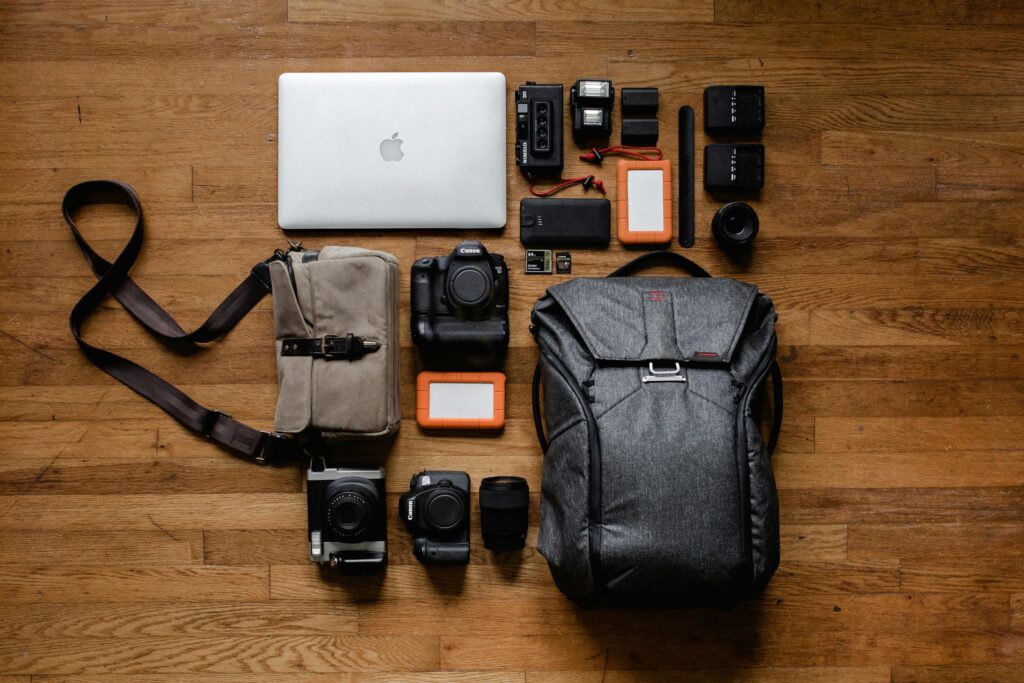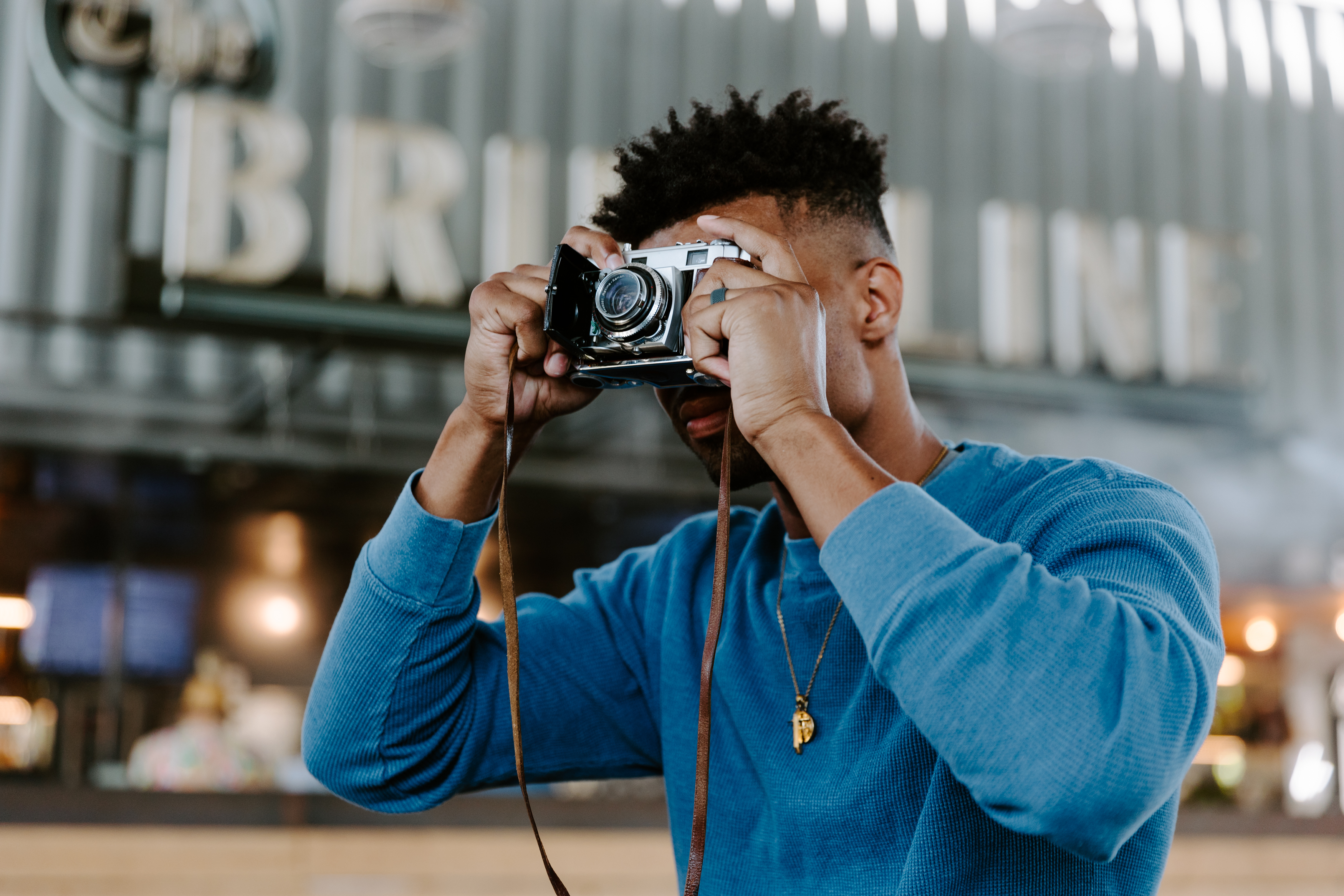If you've been kicking around the thought of starting a photography business, we're here to say DO IT!
This is your moment. It's time to finally get your photography business up and running!
If you aren't quite sure where to start, here is a quick and helpful list of 10 steps to help you on your way to starting a photography business.
It's important to note that this list is for you if you're already into photography as a hobby or maybe you've done a few photoshoots for people already and now want to start and scale a photography business. We will cover photography as an art for beginners in a separate post.
1. Get Your Gear in Order

.
Alright, we all love a bit of gear talk.
You probably already have a few of these but if you're serious about starting a business here's a list of the essentials you should have on hand.
Starting a Photography Business Checklist
Camera and External Equipment for Photographers:
- A camera (DSLR or Mirrorless). Chances are you already have this.
- Lenses – A versatile kit typically includes a prime lens (e.g., 50mm for portraits) and a zoom lens (e.g., 24-70mm for events, and landscapes).
- A tripod – Necessary for stability during long exposures, landscapes, or studio shoots.
- An external flash – For better lighting control, especially in low-light settings.
- A few SD cards – High-capacity and fast read/write speeds are essential to handle large files from photoshoots.
- Backup batteries and chargers – Essential for those long shoots or events.
- An external hard drive – This is for safely storing large photo files and backups.
- Camera Bag – A high-quality, padded bag to transport and protect gear.
Software and Business Tools for Photographers:
- Photo editing software – Adobe Lightroom or Adobe Photoshop will be your best bet starting off.
- Client management software – Something like HoneyBook or Studio Ninja will help manage client bookings, contracts, and payments.
- Online portfolio/website – Something like Showit that allows you to easily build a website with galleries to showcase your talent.
- Basic accounting software – Something like QuickBooks or FreshBooks for invoicing, managing income, expenses, and taxes.
- Plenty of cloud storage – Options like Google Drive or Dropbox will be great for sharing large image files with clients or collaborators.
There are of course several additional options to the products and services listed above. This is just a basic list to help you get started and have everything you need to take provide quality service to someone from your first interaction to the time you deliver the photos and collect the final payment.
2. Choose Your Photography Niche (Eventually)
Shoot a little of this, then a little of that. Photographing various subjects in different situations is a good way to find out what niche you will eventually want your photography business to specialize in.
You’ll notice we included the word ‘eventually' in the heading. That’s because, in the beginning, you’ll likely need to take on a variety of projects to gain experience and generate income.
As you're out there taking on all sorts of projects, start to think about what types of shoots really excite you.
If you enjoy working with babies, kids, or animals and have the patience for long sessions, newborn or pet photography could be your niche. Maybe you’re drawn to capturing weddings, that's a great direction to go as well. If product photography for brands excites you, that's another great path.
The key is to find what type of photography you’re passionate about and build your business around that specialty.
You may already have the perfect niche in mind or you may have to shoot tons of photos to figure out what works best for you. Either way, grab your camera and start shooting, we know you'll find the perfect niche for you and your personality.
3. Scope Out The Competition
As you're starting a photography business, take some time to check out established photographers in your area. Notice what services they offer, their pricing, and how they present themselves through their website and portfolio. Understanding how they address potential clients' needs can help you craft your unique messaging.
Consider searching on Google, checking out other photographers' social media profiles, and reading positive and negative reviews of other photographers.
Also, spend time looking through other photographer's websites to see the quality of their work and what types of services they offer to their clients.
4. Build a Portfolio

.
You're probably going to be shooting a lot of photos as you work on starting a photography business, which is great. Start sorting those photos into individual buckets.
You can store these photos on your computer, post them on social media, or build a website to showcase your work. But the big idea is to have quality samples ready to share when someone says, ‘Can I see some of your recent work?'.
5. Create a Photography Website

.
We mentioned having a website in step 4. While a basic portfolio in a PDF or on social media is helpful, a website gives you greater authority and provides a streamlined way to showcase your work while also capturing potential client information.
Having a website also allows you to provide information about your services, and pricing, while answering any common questions you know potential clients may have.
There are plenty of website builder tools and templates available, but when it comes to photography websites specifically, Showit is the best option. Since this is a Showit blog, we might be a little biased—so take that into account! But, Showit's foundation is built on offering photographers an easy-to-use platform with the freedom to quickly create high-quality websites. With a wide selection of free photography templates and quality U.S.-based support, it’s easy to see why so many photographers trust Showit for their website needs.
And the best part is that we still offer our 14-day, no credit card required free trial, so you can try it out for yourself.
6. Establish Your Pricing
Establishing your pricing can be a challenging task, but it's important to come up with rates that are both fair and profitable as you are starting a photography business.
Consider your costs, the value of your time, and your level of experience. Also, assess the market demand for your services. As you gain more experience photographing and editing high-end luxury cars, you’ll likely be able to charge more than you would for your first few family holiday photoshoots.
Be transparent with your clients about your pricing and what they can expect to receive for their investment.
If you want to dive deeper into the specifics of pricing, check out this article from HoneyBook, where they drill down further on how to set your pricing. You can also check out this video from Katelyn James, a fellow Showit user, where she shares tips on making pricing discussions feel less awkward.
7. Invest In Education
In step 1, we gave you a big “starting a photography business checklist”. That had everything you'll need in terms of gear and software.
But there's another important investment you should make as you're starting a photography business: education.
This can be education on photography skills and techniques or it can be business education. Chances are, you'll need and benefit from both as you are building your photography business.
There are many workshops and events that feature or are produced by photographers and creatives across the country, from large conferences like WPPI to multi-day events like Imaging USA
We live in an amazing time where online education is easily accessible—just like you're doing now. Within our Showit community, several members have extensive experience building photography businesses. Erica + Jon, brand photographers with a passion for teaching, and Amy & Jordan, a husband-and-wife team with over a decade of experience as professional photographers and educators, are two notable examples. Both of these creators offer a wide range of free content and paid masterclasses, which can help you elevate your photography business.
Don’t forget about YouTube—there are countless content creators offering valuable educational resources for free. Some notable creators to check out include Peter McKinnon, Eric Floberg, and Samuel Elkins.
8. Edit Your Own Photos (at the beginning).
As your business grows, you may need to outsource certain elements, including editing.
When you're ready to do that, companies like ShootDotEdit and Photographer's Edit can be great at helping you get a HUGE chunk of time back that you can spend on other aspects of your business.
But in the beginning, we believe it's worth the effort to edit your own photos. It will not only make you a better photographer but also help you understand exactly what you want. That way, when you outsource or hire an editor, you'll be able to provide clear instructions and examples.
9. Get Your Legal Ducks In a Row
If you're serious about starting a photography business, then you have to be serious about running your business like an actual business.
Research the laws in your state and city and be sure that you understand the ins and outs of collecting payments, paying your sales tax, clients signing model releases, contracts, and payment agreements.
A great resource for legal information for photographers is TheLawTog.com. Photographer and lawyer Rachel Brenke offers a variety of products on the site and you can learn a ton by reading her blog, which isn't just about the legalities of running a business, but also about business in general.
And if you're looking for a simple way for clients to sign contracts online, check out our friends at Agree.com. They've built an app for photographers and creatives that does just that.
Whether you plan for your business to be small or large, you must take care of the more tedious tasks and make a plan for how you will manage all of them. This is sometimes an area that creatives cringe over, but it's certainly one of the most important elements in building a business with longevity.
10. Build a Brand That's Unique to You.
Part of starting a photography business is building a brand around that business.
It's easy to get caught up in the notion that your brand is simply the colors and fonts you choose, but it's so much more.
Branding goes far deeper than that, and the photographers and creatives who pay great attention to every detail of their brand are the ones who seem to have the most success. Why? Because a well-designed, well-thought-out brand radiates quality, reliability, and strength.
That translates to value, trust, and eventually, loyalty.
This doesn't mean that to be successful you have to start on day one with a professional designer or a brand manager. It does mean that you should very thoughtfully select the details that you will use to represent your business.
Your brand should be unique to you, and not a copy of what someone else is doing. It should evoke specific emotions in your ideal clients and it should clearly express who you are as an artist.
Part of building your brand includes building and crafting an online identity, which means you're going to need a website.
While we're clearly a little biased, we're not the only ones who believe Showit is the best drag-and-drop website-building platform for creatives. Showit allows you to be you, to build a site that is free from constrained templates; and provides freedom for you to be creative so you can reflect your unique brand and offering.
This is why photographers like Katelyn James and Amy & Jordan use Showit for their websites.
Take The First Step
So there you have it, ten keys that should help you on your way to starting a photography business.
Of course, it's not an exhaustive list and everyone's experience is different. Building a business is hard work, but the results can be incredibly rewarding.
Just get started. You'll absolutely make mistakes along the way and you'll probably have moments where you wonder if you should keep going. That's natural and part of learning anything valuable. Keep at it and you will be amazed with what you can accomplish.
We'd love to hear from you in the comments below what other suggestions you would give to someone just starting their photography business.


